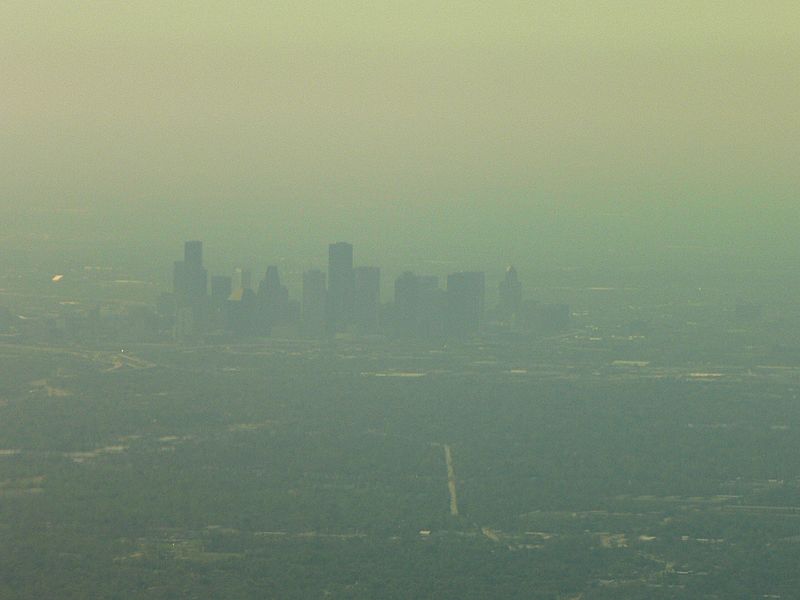
Smog over Houston
Sierra Club, joined by Environmental Defense Fund, Environmental Integrity Project, Texas Environmental Justice Advocacy Services, Public Citizen, Environment Texas, and Air Alliance Houston, submitted comments on the proposed 2020 Annual Monitoring Network Plan to the Texas Commission on Environmental Quality (TCEQ) to ask for improved air quality monitoring for dangerous air pollution across the state of Texas. In addition, we requested further opportunities for notice and comment and at least two public hearings in Houston and El Paso on the plan for additional input.
Air quality monitoring is an important tool in understanding the negative effects that pollution has on Texas air quality and every year, TCEQ is required to update its air monitoring plan for the state of Texas. Unfortunately, Texas has never provided the necessary monitoring network to assure that we can determine air quality in our vast state.
We have some of the largest sources of industrial pollution in the country, including the largest known source of sulfur dioxide (SO2) pollution in the country from Luminant’s Martin Lake coal plant in North east Texas; a massive industrial complex along the Gulf Coast; and oil and gas production in West Texas that is largely unmonitored. Air quality monitoring empowers communities with vital information that allows them to take action against big polluting industries, and helps determine what kinds of regulatory and voluntary actions are needed to protect the public’s right to clean air.
“While the coal sector across the country and here in Texas is certainly in decline, burning coal is still a disproportionate source of dangerous pollution that threatens public health,” said Chrissy Mann, Senior Campaign Representative Sierra Club Beyond Coal Campaign. “Texas coal-burning power plants are under-monitored but belch more sulfur pollution than all of the sources in Arkansas, Louisiana, Oklahoma, Arizona, Colorado, Kansas, New Mexico, and Mississippi, combined. In order to protect Texans, as our comments demonstrate, TCEQ must face facts and properly monitor the impacts of the cocktail of pollution pouring out of Texas coal plants.”
A key recommendation in the joint comments filed today was the need to move forward on enhanced particulate matter and volatile organic compound (VOC) air quality monitoring in the Houston area, in part due to concentrated industrial operations and persistent unauthorized emissions. Houston communities face historic and chronic pollution that is little understood because of a lack of air quality data. Areas like the Fifth Ward in Houston are imperiled by excess emissions and yet there are no VOC monitors to determine the extent of the crisis.
“We support the proposal to add PM monitoring to the Houston region, but communities from the Fifth Ward to Manchester to the Ship Channel need more robust action so they are better protected from pollution spewing from neighboring fossil fuel industries,” said Juan Parras, the founding member of Texas Environmental Justice and Advocacy Services (T.E.J.A.S.). “We need TCEQ to open up the process to get more input from Houstonians and hold a public meeting on their plan. The first step in protecting public health from air pollution is to actually measure air quality.”
Additionally, communities along the Gulf Coast, including in the Corpus Christi area and the Rio Grande Valley, are facing new air quality challenges as oversupply of oil and gas has fueled a refining and petrochemical industry expansion. These communities deserve to know what is in the air too, and comments recommend adding both particulate matter and VOC monitoring in particular in the Portland-Gregory area just north of Corpus Christi, where TCEQ recently authorized massive emissions from the new Exxon-SABIC ethane cracker. While there are significant new emissions, there are no plans to increase air quality monitors to track the pollution.
Staggering sulfur dioxide emissions across Texas pose a serious public health threat that warrants not just enhanced monitoring, but a reconsideration of Texas’ SO2 modeling. The TCEQ must address the lack of monitoring in communities where oil and gas drilling continue to flare and vent air pollution at unprecedented and dangerous levels. West Texas communities know they are exposed to ozone and SO2 pollution but lack air quality data to protect their health and to require stronger protections from polluting industries. In fact, only two monitors - one particulate matter monitor in Odessa and one SO2 monitor in Big Spring -- currently exist, and TCEQ appears to have no plans to expand SO2, PM and ozone monitoring in West Texas despite the vast truck traffic, flares and oil and gas drilling occuring in the region.
“The Railroad Commission of Texas has not just ignored air pollution in West Texas for decades- they’ve been encouraging it. Their decision over the last 10 years to allow endless permits to flare hundreds of thousands of metric tons of gas every day is just one instance of condoning pollution,” said Cyrus Reed, Sierra Club Lone Star Chapter Interim Director. “But we will not let this go on unchecked. There is a desperate need for more monitoring of sulfur dioxide and ozone pollution in West Texas.